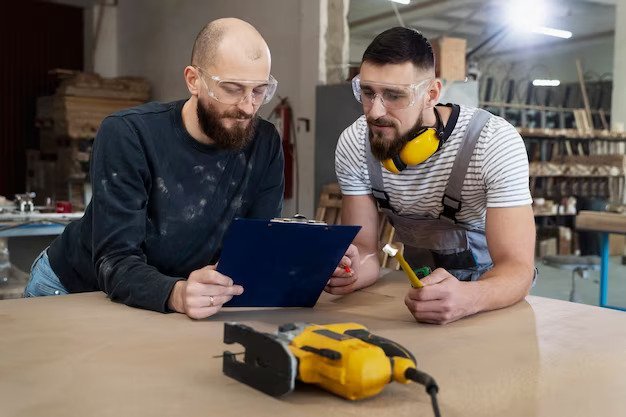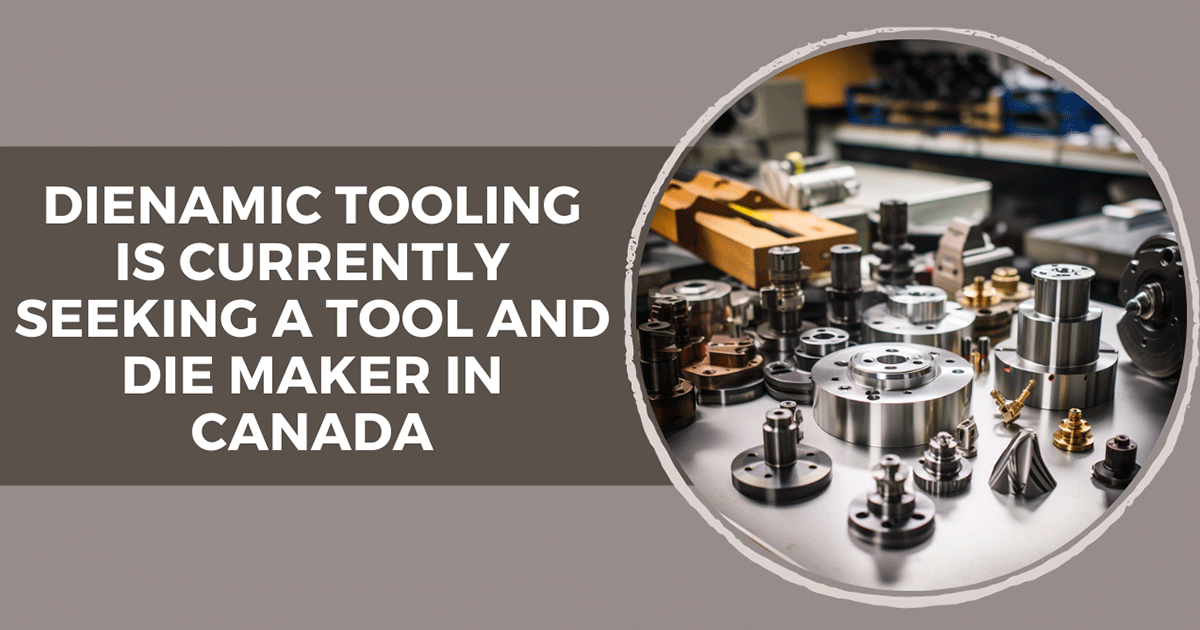Tool And Die : We’re looking for someone skilled and experienced in making tools and dies to join our team. This person will be in charge of creating and taking care of precise tools, molds, and equipment used in making things. The best candidate for this job should be really good with technical stuff, pay close attention to small details, and be able to work with very precise machines.
Job Details
- Location : Cambridge, ON
- Salary : 27.60 hourly / 40 hours per week
- Terms of employment Permanent employment : Full time
- Start date : Starts as soon as possible
- Vacancies : 1
- Verified
Overview
Languages
- English
Education
- Secondary (high) school graduation certificate
Experience
- 1 year to less than 2 years
Work Site Environment
- Noisy
Work Setting
- In shop
Responsibilities

- Understand Plans: Look at engineering drawings and plans to know what’s needed.
- Use Machines: Use different machines like lathes, mills, grinders, and EDM machines to make precise parts.
- Make Tools and Parts: Create tools, dies, jigs, and fixtures from different materials like metal, plastic, and composites.
- Put Things Together: Fit and assemble parts to make complete tools and dies.
- Check Quality: Test the tools, dies, jigs, and fixtures to make sure they work well and are accurate.
- Fix and Maintain: Repair and take care of tools, dies, and fixtures to make them last longer and work better.
- Work with Others: Work with engineers and other team members to make tools and dies better and improve how they are made.
- Solve Problems: Figure out and fix any issues with the tools and dies.
- Stay Safe: Follow safety rules and keep the work area clean.
- Stay Informed: Keep up with what’s new in the industry and how to make tools and dies better.
Requirements
- Education: You should have at least a high school diploma or something similar. It’s even better if you’ve finished a special training program for tool and die making.
- Experience: It’s helpful if you’ve worked as a Tool and Die Maker before, especially in a place where things are made or machines are used.
- Read Drawings: You should be good at looking at engineering drawings and blueprints and understanding what they show.
- Know Your Stuff: You need to know a lot about how to make things with machines, what materials to use, and how to measure things very precisely.
- Work Machines: You should be able to set up and use different machines very carefully and make sure they work perfectly.
- Computer Skills (Optional): It’s a plus if you know how to use computer programs like CAD/CAM for making designs, but you don’t have to.
- Attention to Detail: You have to pay close attention to small details and be good at solving problems.
- Team Player: You should be able to work well with others and talk to them effectively.
- Physical Strength: Being fit and able to use tools and machines for long periods is important.
- Safety First: Always make sure you and your coworkers are safe while working.
Tasks
- Measure and Prepare: Measure and set up the machine tools accurately.
- Check for Quality: Make sure the finished parts match the given specifications using precise measuring tools.
- Understand Blueprints: Read and understand blueprints, maps, drawings, and specifications.
- Build Molds and Models: Create molds, core boxes, and precise models by machining and assembling various parts, including castings.
- Quality Inspection: Examine and test the final products to ensure they meet the required standards.
- Operate EDM Machines: Set up and run electrical discharge machines.
- Create Patterns: Lay out, shape, and put together patterns using materials like metal, wood, plastic, etc., based on blueprints or templates.
- Prepare Metal: Secure and measure metal stock or castings for machining.
- Use CNC Machines: Operate and maintain a variety of traditional and computer-controlled machine tools.
Experience And Specialization

Patternmaking Experience
- Master patterns
- Metal patternmaking
Tool And Die Fabrication Experience
- Jigs and fixtures
- Metal cutting, forming or bending dies
Additional Information
Transportation/Travel Information
- Own transportation
Work Conditions And Physical Capabilities
- Fast-paced environment
- Handling heavy loads
- Attention to detail
- Hand-eye co-ordination
- Standing for extended periods
Personal Suitability
- Accurate
- Flexibility
- Organized
- Team player
Who Can Apply To This Job?
Apply To This Job Only If
- You are a Canadian citizen, a permanent or a temporary resident of Canada.
- You have a valid Canadian work permit.
If you are not authorized to work in Canada, do not apply. The employer will not respond to your application.
How To apply
By email
dienamicjobs@gmail.com
Advertised until
2023-09-14
FAQs
1: What is a tool and die maker?
A tool and die maker is a skilled professional who creates and maintains specialized tools, dies, jigs, and fixtures used in the manufacturing process. These professionals work with precision machinery and materials to produce components that are crucial for various industries, including automotive, aerospace, and electronics.
2: What does a tool and die maker do?
Tool and die makers read engineering drawings and blueprints to design, build, and maintain tools and dies. They set up and operate machine tools, use computer-aided design (CAD) software for design, test completed tools for accuracy, and troubleshoot any issues that may arise during the manufacturing process.
3: What industries require tool and die makers?
Tool and die makers are essential in industries that rely on precision manufacturing, such as automotive, aerospace, electronics, and consumer goods. They play a critical role in creating components that meet strict specifications and quality standards.
4: What skills are required to become a tool and die maker?
To become a successful tool and die maker, you need a strong understanding of engineering drawings, precision measurement instruments, and machining techniques. Proficiency in operating various machine tools and CAD software for design is often required. Attention to detail, problem-solving abilities, and a commitment to safety are also crucial.
5: How can I become a tool and die maker?
Many tool and die makers start by completing a recognized apprenticeship program or technical school training in tool and die making. These programs provide hands-on training and classroom instruction to develop the necessary skills. Some individuals may also gain experience through on-the-job training or by working as machinists before specializing in tool and die making.
Source Image : Freepik.com





